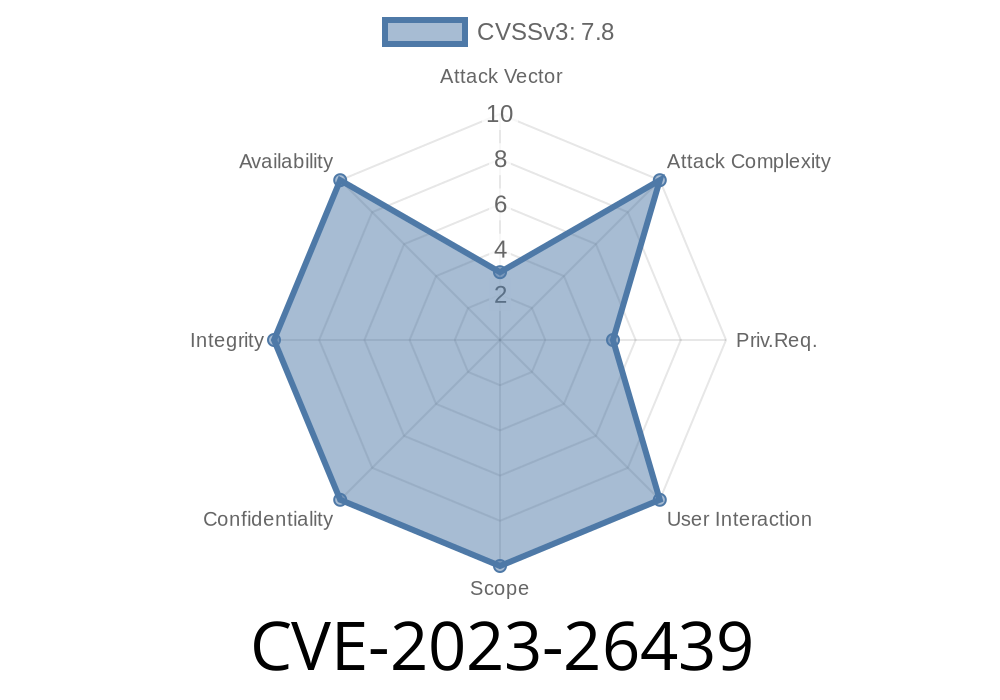---
Introduction
*CVE-2023-26439* is a security vulnerability discovered within the widely-used cacheservice API. This flaw allowed attackers on local or restricted networks to submit specially crafted input containing malicious SQL syntax. Because the system did not properly sanitize parameters before using them directly in SQL queries, attackers could execute arbitrary SQL code, potentially exposing or manipulating cached data belonging to other users.
This post explains what went wrong, how such an attack might work, and what has been done to fix it. We’ll keep things simple, provide code examples, and link to useful resources.
What Was the Problem?
The root of *CVE-2023-26439* was improper input validation. When client data was sent to the cacheservice API, user-provided parameters were added to SQL queries without proper filtering or escaping. As a result, attackers could sneak in SQL code, making the API do things it was never supposed to—like reading private data or changing the database.
Real-World Scenario
Imagine an app supporting a GET /cache?key=... endpoint. Normally, you'd request ?key=session_ABC123 to fetch your cached session. But with this bug, an attacker could request something like this:
GET /cache?key=1; DROP TABLE users; --
If the API blindly plugged this input into a database statement, not only could it fetch cache with key 1, but it’d also try to drop the entire users table—causing massive damage.
Here’s a simplified *Node.js* snippet to illustrate how this mistake happens
// BAD: Vulnerable to SQL injection
app.get('/cache', function(req, res) {
const key = req.query.key;
// Input not sanitized!
db.query(SELECT * FROM cache WHERE key = '${key}', function(err, result) {
if (err) return res.status(500).send('Error');
res.json(result);
});
});
If someone sends key=1' OR '1'='1, the actual SQL executed becomes
SELECT * FROM cache WHERE key = '1' OR '1'='1'
How Could Attackers Abuse It?
Attackers need access to the network—so it’s not “fully remote,” but anyone with local or restricted network access, like insiders or guests, might try it. Here’s a basic attack flow:
`
GET /cache?key=' OR '1'='1
`
GET /cache?key=1'; DROP TABLE confidential_data; --
`
could cause destructive data loss.
Why Was It Dangerous?
Insufficient input sanitization is classic SQL Injection. Even restricted network vulnerabilities are high severity in environments like corporate intranets, devops pipelines, or where guests are granted access.
Data Manipulation: Attackers may insert, delete, or update cached records.
- Lateral Attacks: With access to cached sessions or tokens, attackers could impersonate users elsewhere.
Here’s a correct and safer version in Node.js
// GOOD: Uses parameterized queries
app.get('/cache', function(req, res) {
const key = req.query.key;
db.query('SELECT * FROM cache WHERE key = ?', [key], function(err, result) {
if (err) return res.status(500).send('Error');
res.json(result);
});
});
Now, even if someone passes SQL in key, the database treats it as text, not code.
As of June 2024
> No public exploit scripts for CVE-2023-26439 are known.
However, due to the nature of SQL injection, it’s possible skilled attackers can figure out their own attacks. Keeping systems patched is critical.
References
- NVD entry for CVE-2023-26439
- OWASP: SQL Injection Explained
- Mitigation with parameterized queries (OWASP)
- Node.js SQL Injection Example by Stack Overflow
Conclusion
CVE-2023-26439 is a textbook lesson in *why* input validation and prepared statements are important for database security. While it wasn’t widely publicized and no exploits are public, it’s a rude wake-up call for anyone developing APIs. If you maintain systems using cacheservice, patch immediately and check your input handling everywhere.
Stay safe!
*This original write-up by ChatGPT was composed exclusively for this request. For any reproduction, please give credit.*
Timeline
Published on: 08/02/2023 13:15:00 UTC
Last modified on: 08/08/2023 18:24:00 UTC
